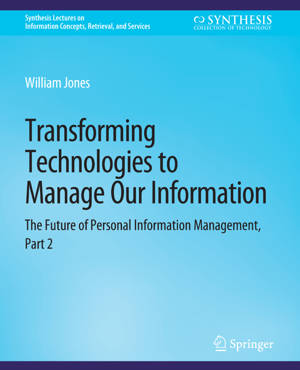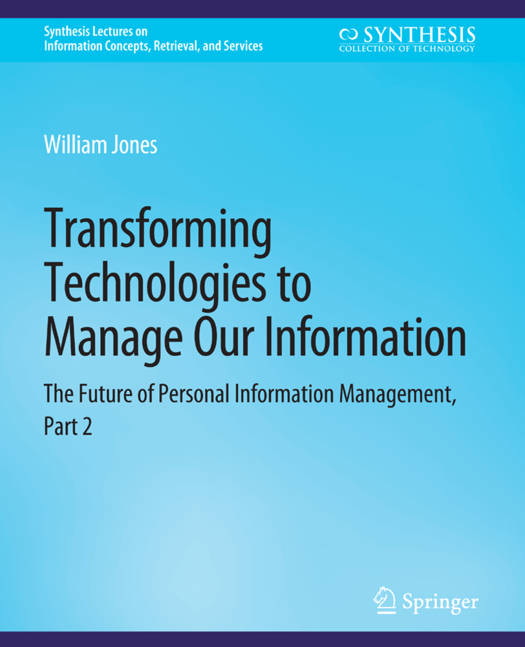
- Afhalen na 1 uur in een winkel met voorraad
- Gratis thuislevering in België vanaf € 30
- Ruim aanbod met 7 miljoen producten
- Afhalen na 1 uur in een winkel met voorraad
- Gratis thuislevering in België vanaf € 30
- Ruim aanbod met 7 miljoen producten
Zoeken
Transforming Technologies to Manage Our Information
The Future of Personal Information Management, Part 2
William Jones
€ 34,95
+ 69 punten
Uitvoering
Omschrijving
With its theme, "Our Information, Always and Forever," Part I of this book covers the basics of personal information management (PIM) including six essential activities of PIM and six (different) ways in which information can be personal to us. Part I then goes on to explore key issues that arise in the "great migration" of our information onto the Web and into a myriad of mobile devices. Part 2 provides a more focused look at technologies for managing information that promise to profoundly alter our practices of PIM and, through these practices, the way we lead our lives. Part 2 is in five chapters: - Chapter 5. Technologies of Input and Output. Technologies in support of gesture, touch, voice, and even eye movements combine to support a more natural user interface (NUI). Technologies of output include glasses and "watch" watches. Output will also increasingly be animated with options to "zoom". - Chapter 6. Technologies to Save Our Information. We can opt for "life logs" to record our experiences with increasing fidelity. What will we use these logs for? And what isn't recorded that should be? - Chapter 7. Technologies to Search Our Information. The potential for personalized search is enormous and mostly yet to be realized. Persistent searches, situated in our information landscape, will allow us to maintain a diversity of projects and areas of interest without a need to continually switch from one to another to handle incoming information. - Chapter 8. Technologies to Structure Our Information. Structure is key if we are to keep, find, and make effective use of our information. But how best to structure? And how best to share structured information between the applications we use, with other people, and also with ourselves over time? What lessons can we draw from the failures and successes in web-based efforts to share structure? - Chapter 9. PIM Transformed and Transforming: Stories from the Past, Present and Future. Part 2 concludes with a comparison between Licklider's world of information in 1957 and our own world of information today. And then we consider what the world of information is likely to look like in 2057. Licklider estimated that he spent 85% of his "thinking time" in activities that were clerical and mechanical and might (someday) be delegated to the computer. What percentage of our own time is spent with the clerical and mechanical? What about in 2057?
Specificaties
Betrokkenen
- Auteur(s):
- Uitgeverij:
Inhoud
- Aantal bladzijden:
- 155
- Taal:
- Engels
- Reeks:
Eigenschappen
- Productcode (EAN):
- 9783031012013
- Verschijningsdatum:
- 24/10/2013
- Uitvoering:
- Paperback
- Formaat:
- Trade paperback (VS)
- Afmetingen:
- 191 mm x 235 mm
- Gewicht:
- 357 g

Alleen bij Standaard Boekhandel
+ 69 punten op je klantenkaart van Standaard Boekhandel
Beoordelingen
We publiceren alleen reviews die voldoen aan de voorwaarden voor reviews. Bekijk onze voorwaarden voor reviews.











